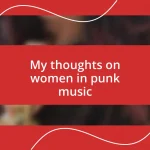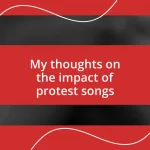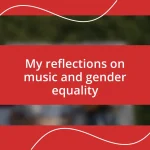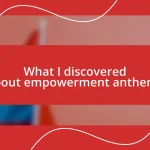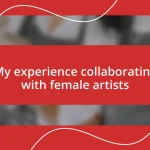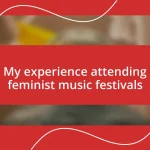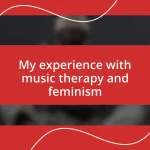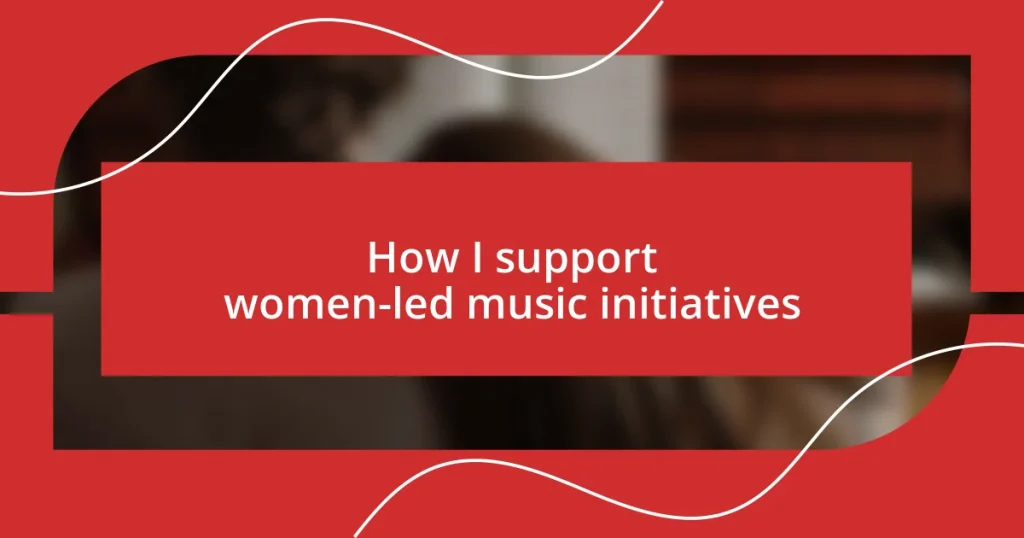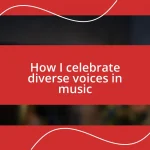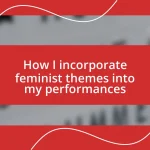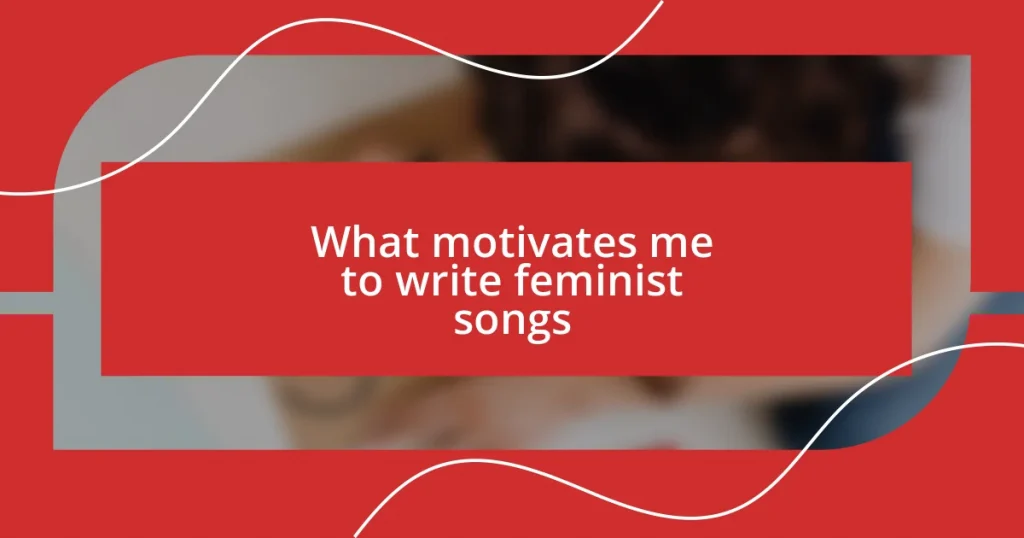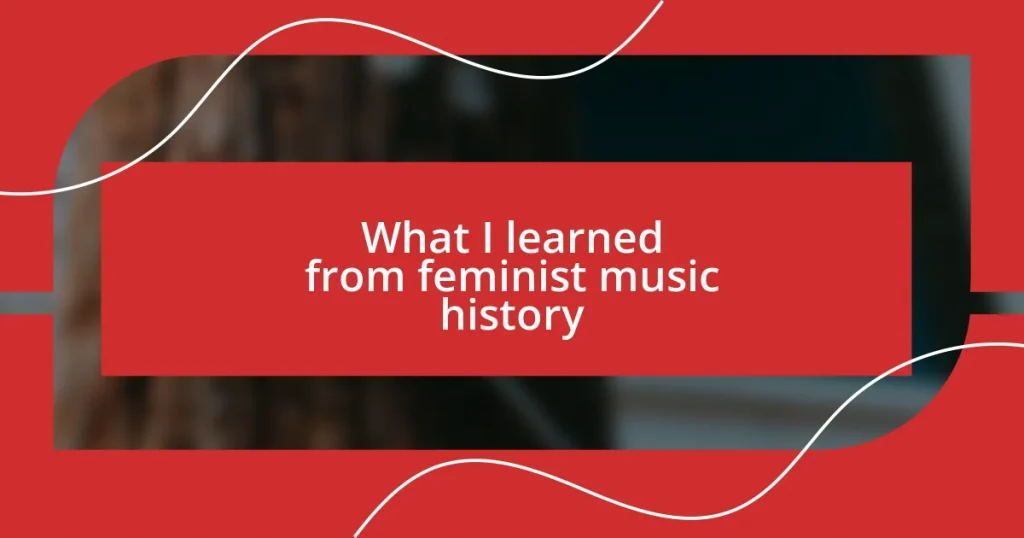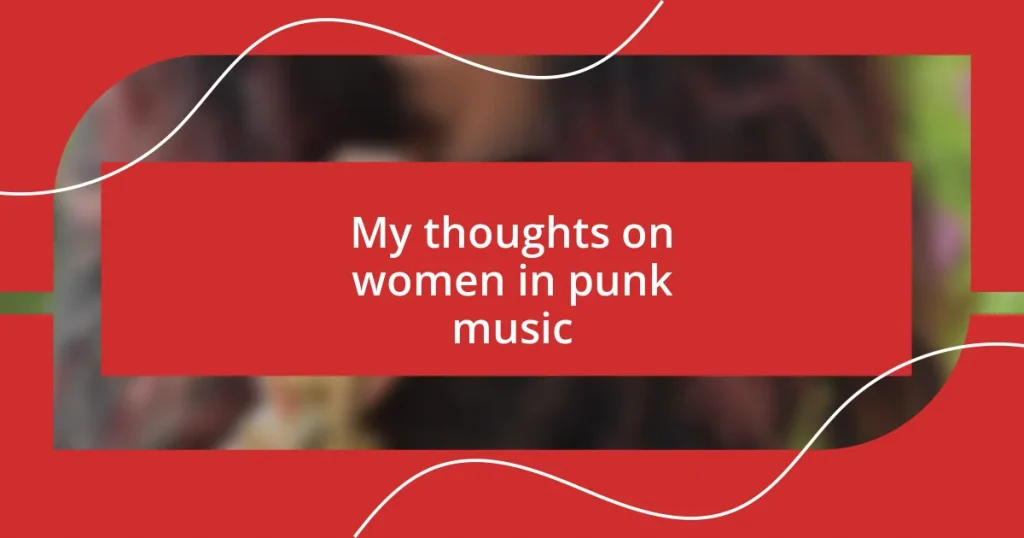Key takeaways:
- Women-led initiatives in the music industry foster empowerment, collaboration, and emotional connection, enriching the art form with diverse narratives.
- Building supportive networks and mentorship programs is crucial for cultivating talent and providing opportunities for emerging female artists.
- Promoting women musicians in media enhances visibility and representation, shaping community perceptions and inspiring future generations of artists.
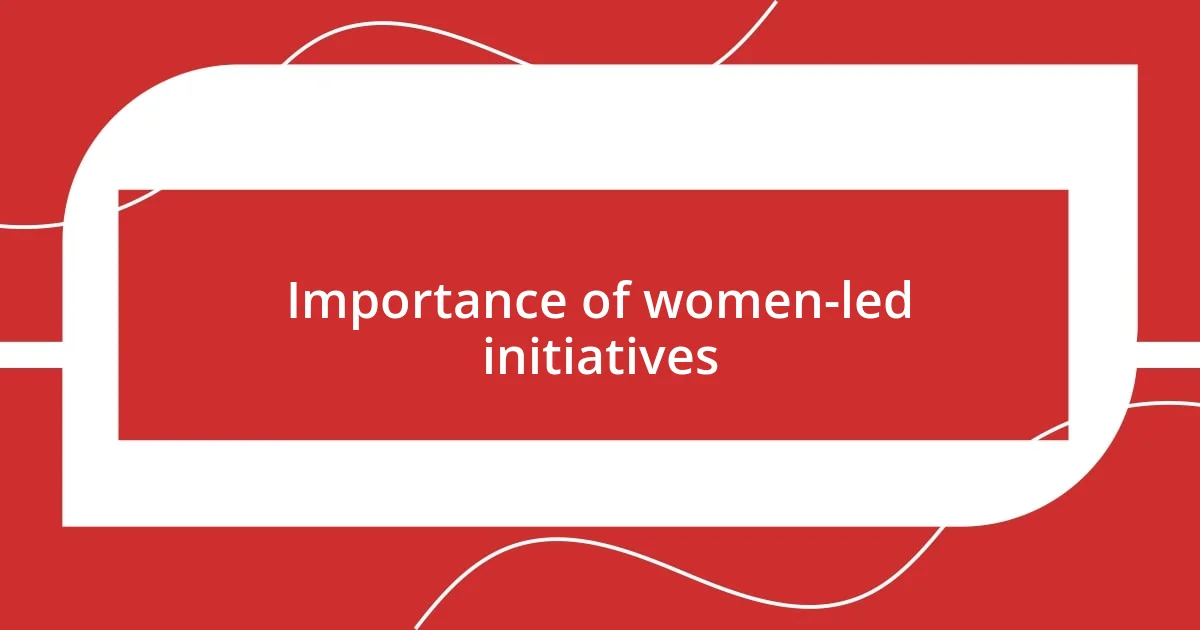
Importance of women-led initiatives
Women-led initiatives play a vital role in reshaping the music industry. I remember attending a local concert organized by a group of talented women; the atmosphere was electric. It wasn’t just about the music; it was about empowerment, collaboration, and breaking barriers. This collective energy inspires not only the artists but also the audiences, sparking conversations that encourage equality in a traditionally male-dominated space.
When women lead music initiatives, they bring unique perspectives and experiences that enrich the art form. Think about the diverse narratives we might miss without their voices. Each melody and lyric tells a story shaped by different life experiences, fostering a deeper emotional connection with listeners. Personally, I’ve found that songs from women often resonate on levels I didn’t even know I needed, opening pathways to understanding and healing.
Moreover, these initiatives create mentorship opportunities for the next generation of female artists. I once spoke with a young musician who expressed how a women-led workshop transformed her confidence. She shared her journey from feeling invisible in the industry to finding a supportive network that champions her talents. Isn’t it incredible how women can empower one another and reshape the narrative together?
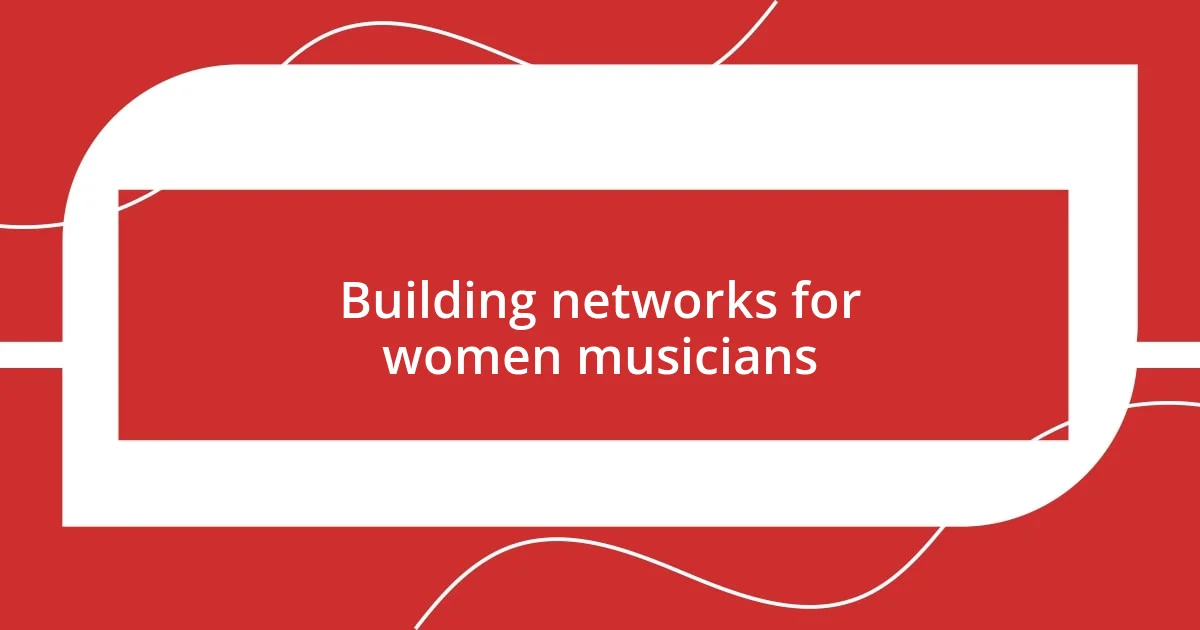
Building networks for women musicians
Building networks for women musicians is fundamental in fostering a supportive environment where creativity can flourish. I recall a moment when I participated in a roundtable discussion among women musicians. We shared our struggles and triumphs, and it was eye-opening to realize that many of our experiences mirrored each other. These conversations not only provided comfort but also sparked collaborations that wouldn’t have occurred otherwise. Each shared story strengthened our bond and expanded our horizons.
Beyond sharing stories, these networks create tangible opportunities for collaboration and performance. I once organized a showcase that featured women artists from various genres. The energy on stage was electric, as each performer brought her unique style to the spotlight. This event became a catalyst for many of us, leading to songwriting partnerships and joint performances. It’s truly inspiring to see how building connections can translate into creative projects that might not happen in isolation.
Furthermore, I believe that online platforms play a significant role in expanding access to these networks. I’ve joined various social media groups dedicated to women musicians, where we exchange resources, advice, and opportunities. One time, I connected with a fellow artist halfway across the globe, leading to an unexpected collaboration that resulted in a powerful piece of music. It’s a testament to how technology can bridge distances and create friendships that propel our artistry forward.
| Key Aspects | Examples |
|---|---|
| Networking Opportunities | Mentorship, Collaborations |
| Support Systems | Shared Experiences, Emotional Connections |
| Online Platforms | Global Connections, Resource Sharing |
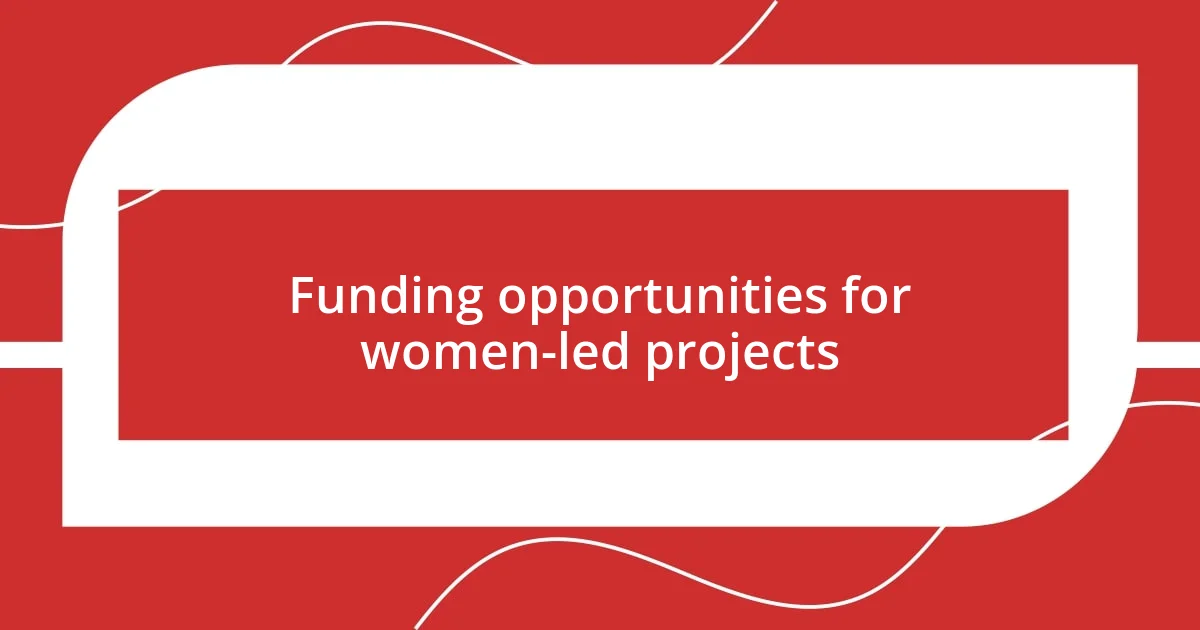
Funding opportunities for women-led projects
Finding funding opportunities for women-led music projects can be challenging, but there are numerous avenues worth exploring. I remember the thrill of discovering a local grant specifically aimed at promoting female artists. It felt like a beacon of hope in a sea of possibilities, knowing that financial support was available to help bring creative visions to life. This kind of funding not only empowers individual artists but also strengthens the entire community by uplifting diverse voices.
Here are some noteworthy funding opportunities for women-led music initiatives:
- Grants and Fellowships: Apply for grants such as the “Berkeley Arts Grant” or the “Women’s Fund for California,” both of which offer financial support for women-led initiatives.
- Crowdfunding Platforms: Utilize platforms like Kickstarter or Indiegogo to raise funds while connecting with your audience directly.
- Music Competitions: Participate in contests like the “Women Who Rock” competition, which often provide cash prizes or performance opportunities.
- Corporate Sponsorships: Reach out to companies that prioritize diversity; many have specific programs to support women in the arts.
- Government Programs: Investigate local arts councils or tourism boards that offer funds dedicated to promoting cultural initiatives led by women.
The importance of tapping into these resources cannot be overstated. I vividly recall when a fellow musician received a small grant that allowed her to record an album she had been dreaming about for years. Seeing her finally share her work with the world was a reminder of how funding can transform a vision into reality. It’s not just financial support; it becomes a springboard for creativity and community engagement. Embracing these opportunities can lead to remarkable outcomes that reaffirm the importance of women-led projects in the music industry.
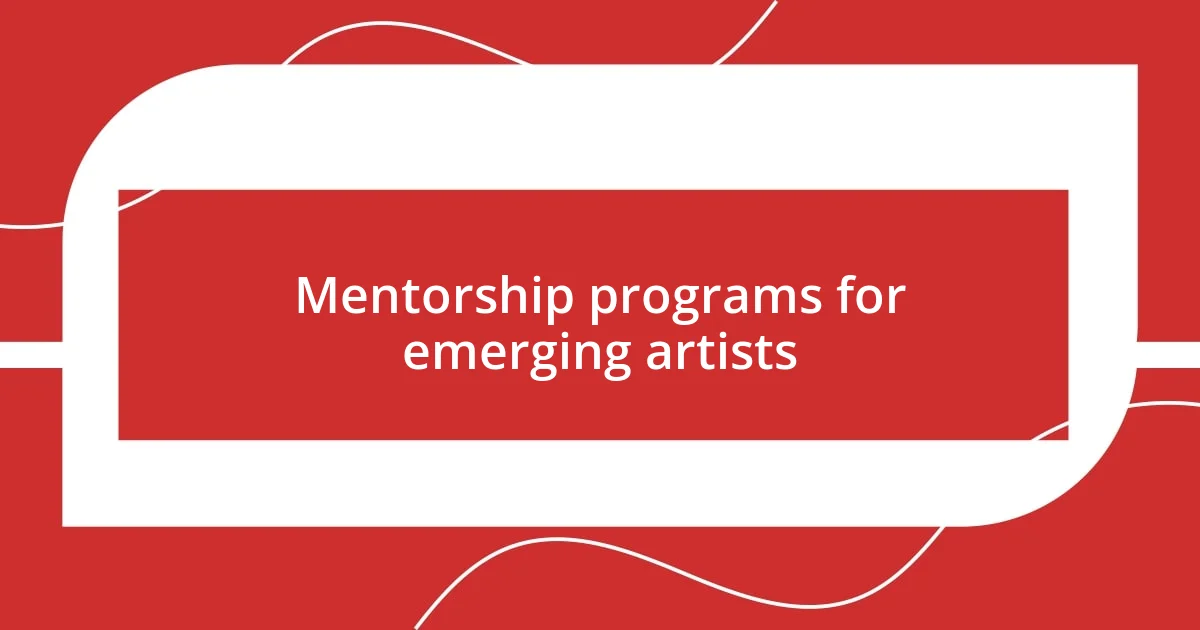
Mentorship programs for emerging artists
Mentorship programs for emerging artists are vital in cultivating talent and fostering confidence. I remember my first mentorship experience like it was yesterday—being paired with a seasoned musician who not only guided my creative process but also helped me navigate the often-tricky industry landscape. This guidance is invaluable; it’s like having a flashlight in the dark, illuminating paths I didn’t even know existed. Have you ever had someone believe in your potential before you did? That’s the magic of mentorship.
One impactful initiative I participated in paired young artists with industry veterans for a series of workshops and discussions. I’ll never forget one session where we explored the nuances of songwriting and performance. The mentor’s stories about her own struggles and successes resonated with us, reminding me that even the most accomplished artists once stood where we did—filled with uncertainty. This not only made me feel more connected but also empowered me to take risks in my own music.
Furthermore, some mentorship programs extend beyond the usual one-on-one setting to include group sessions where artists can share their work and receive constructive feedback. During one of these sessions, I shared a draft of my song, and the supportive feedback I received from both peers and mentors was a game-changer. It taught me that collaboration and community are just as crucial as individual skill. These experiences reinforced my belief that mentorship is a cycle of uplifting one another, creating a ripple effect of support that can energize an entire generation of women artists.
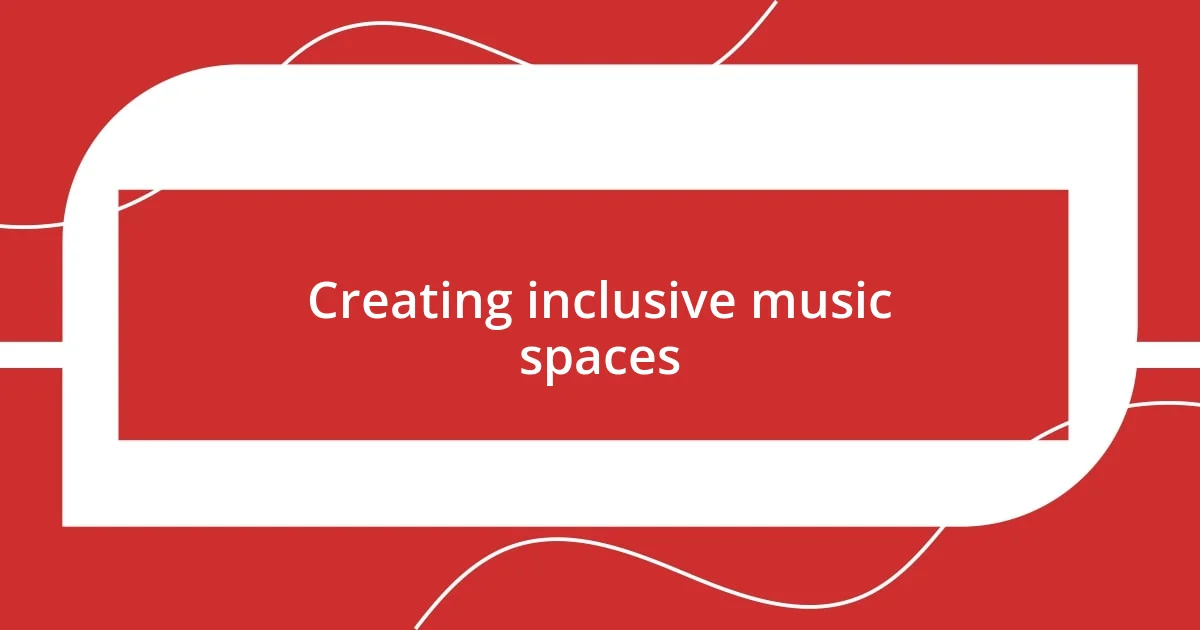
Creating inclusive music spaces
Creating inclusive music spaces is essential for nurturing diverse talent and fostering a sense of belonging. I often reflect on a local jam session I attended, where people from various backgrounds came together to share their music. It was a transformative experience; I felt the energy lift as each artist brought their unique flavor to the collective sound. Have you ever entered a room where creativity simply thrived? That’s the power of inclusivity—it sparks collaboration and innovation in ways I never anticipated.
I’ve seen the impact firsthand when venues actively support women-led events. At one particular festival, the organizers made it a point to highlight female musicians on all stages. It was heartwarming to see the audience engage so enthusiastically with performers who looked like them. That representation matters; when we see ourselves reflected on stage, it reminds us that we, too, can shine. I remember standing in the crowd, feeling a rush of pride and inspiration as a young girl stepped up to perform, conquering her stage fright. It was a beautiful reminder of how powerful music can be in shaping self-confidence.
Moreover, creating an environment where everyone feels welcome means addressing barriers that often exist in the industry. I once participated in a workshop dedicated to accessibility in music spaces. The discussions opened my eyes to challenges faced by artists with disabilities and encouraged us to brainstorm solutions together. It made me realize—how often do we consider the voices that are absent in our discussions, and what can we collectively do to ensure everyone has a seat at the table? Building inclusive music spaces isn’t just a nice-to-have; it’s a fundamental necessity for growth and innovation within our communities.
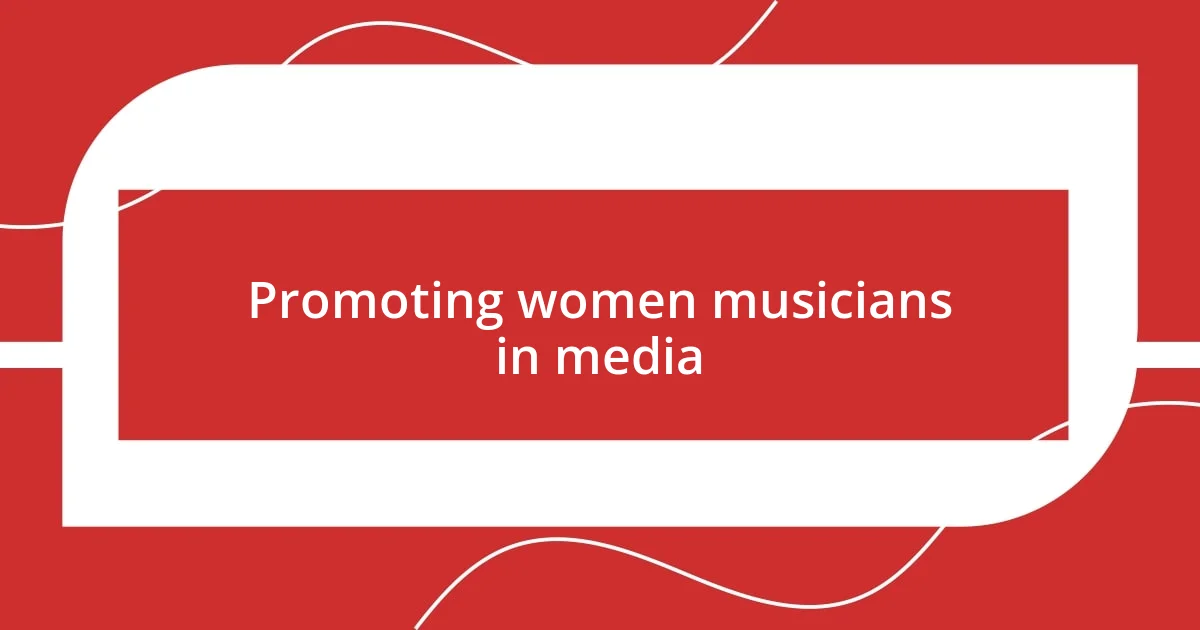
Promoting women musicians in media
Promoting women musicians in media is essential for changing narratives and paving the way for broader acceptance. I remember stumbling across a podcast that featured only female artists, and the experience was refreshing. Listening to their unique stories and musical journeys made me realize how often women’s voices are sidelined in mainstream media. Wouldn’t it be incredible if every music platform celebrated diversity in representation?
On another occasion, I had the privilege of attending a film screening showcasing female musicians and their contributions to the art form. The energy in the room was palpable; it felt like we were part of a celebration rather than just viewers. Conversations erupted about who inspired us and how visibility influences young artists. I found myself discussing the significance of sharing these narratives—not just for awareness but as a source of empowerment for aspiring musicians. Isn’t it inspiring to think how visibility can spark a chain reaction of confidence?
Additionally, collaborating with local media outlets to feature women-led initiatives can deeply impact community perception. I once collaborated on an article that highlighted emerging female artists in our region. The feedback was overwhelming, as both artists and listeners expressed gratitude for finally being acknowledged. I realized then that media doesn’t merely reflect reality; it shapes it. How can we not prioritize these voices when they hold the power to inspire countless others?


